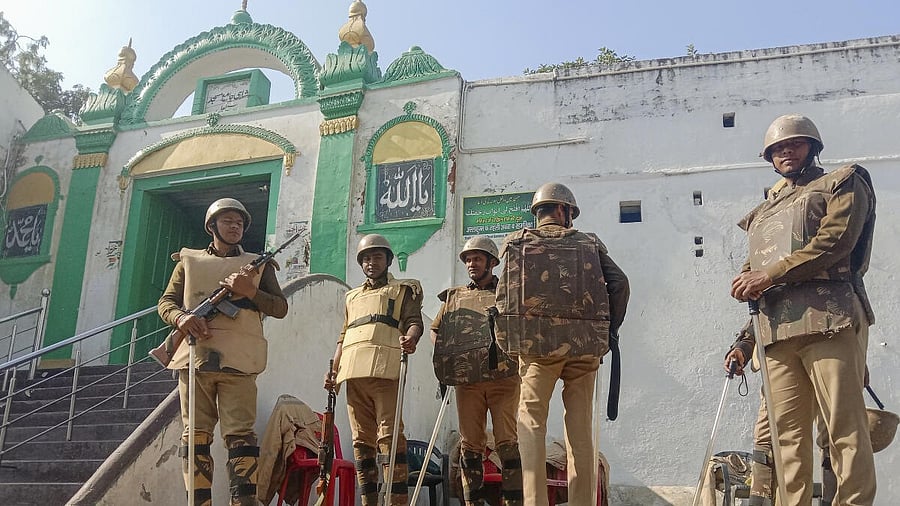
Police and security personnel stand guard outside the Shahi Jama Masjid amid Friday prayers, in Sambhal
Credit: PTI Photo
Is it the upcoming Milkipur Assembly bypolls, which the BJP must win to save face after losing the prestigious Ayodhya Lok Sabha seat? Is it frustration over the Supreme Court’s stay on surveys of disputed mosques, most of which are in Uttar Pradesh?
What’s the reason behind the unrelenting hounding of Sambhal’s Muslims by the administration since November 24, when violence erupted as rumours spread that the city’s largest mosque was being dug up? Five young Muslims died in police firing, and 51 have been arrested. Sambhal MP Ziaur Rahman Barq of the Samajwadi Party, not only had cases foisted on him, but the electricity to his home was cut off and parts of his home demolished.
Uttar Pradesh Chief Minister Yogi Adityanath has a history with the young MP’s family. The latter’s grandfather, Shafiqur Rahman Barq, was called ‘Babur ki aulad’ by Adityanath during the 2019 Lok Sabha campaign. The 88-year-old had by then, represented Sambhal four times as MLA, and once as MP. While even the much enfeebled ECI sent Adityanath a notice for this abuse, Shafiqur Rahman Barq went on to win Sambhal for the second time, with 55.6% of the vote and a victory margin of 1,74,826 against his BJP rival.
In last year’s Lok Sabha polls, police lathi-charged and allegedly tried to prevent Sambhal’s Muslims from voting. Nonetheless, the SP candidate won.
Since Sambhal became a Lok Sabha constituency in 1977, the BJP has won this Muslim-majority seat only once, during the Narendra Modi wave in 2014. Could this be one reason for Adityanath’s determination to teach Sambhal’s Muslims a lesson? The latest manifestation of this is his directive to open the files of a riot that took place there almost half a century ago.
In the Assembly, he gave vivid descriptions of the way ‘184 Hindus’ were allegedly butchered and then burnt alive in Sambhal in 1978. However, Sambhal does not figure in any list — official or unofficial — of communal riots with a death toll of more than 100. What then is the source of the CM’s ‘data’?
Can Adityanath, while enumerating communal riots, talk only of the death toll of one community? Can one who holds a constitutional post that obliges him to treat citizens equally, ask the Opposition in the Assembly: “209 Hindus died and you talk about harmony?”
‘Justice needs to be done’ and ‘victims are keen to know what happened’ are the reasons being given by Adityanath’s ministers for the reopening of the 1978 riot files.
Going by this writer’s experience in following up riot cases in Mumbai, far from being keen, victims hate having traumatic memories revived if there’s no chance of justice. Can justice be delivered after about 50 years? After all, 168 cases were filed immediately after the riots. Incidentally, at that time, both UP and the Centre were governed by a coalition Janata Party government, with ministers from the Jan Sangh, the precursor to the Bharatiya Janata Party (BJP).
In this quest for ‘justice’, surely these worthies should be questioned first, followed by the men in uniform empowered to prevent and control a riot. Also, will justice be similarly pursued for victims of all communal riots that took place decades ago in UP, including Moradabad, Aligarh, Meerut, Hashimpura, and Maliana?
In 2023, the police closed down Sambhal’s Muslim eateries during the kanwar yatra, even though they were ready to serve only vegetarian food. Over the last month, the administration has been systematically searching for underground temples and wells. Once unearthed, worship begins immediately, accompanied by warnings that ‘encroachments’ on these ‘ancient temples’ will be demolished. Given that 78% of Sambhal’s population is Muslim, it is hardly surprising that most of these discoveries have been found under Muslim homes. These Muslims have now started demolishing their own homes.
Just last week, the Supreme Court stepped in to stop the Sambhal administration from facilitating Hindu worship of a well being used by the Shahi Jama Masjid. But now, Adityanath has declared that courts should play no role when such claims are made; that, once a mosque is claimed to be a temple, it should no longer be called a mosque and Muslims must give up all claims to it, for while Hindus need a temple for worship, Muslims can pray anywhere. Did the CM forget that his police has filed cases against Muslims for praying in public and even in their homes?
It’s two years till the next Assembly elections. For the Muslims of Sambhal, these two years will probably be spent running to court as their chief minister pursues his majoritarian agenda.
(Jyoti Punwani is a senior journalist.)
Disclaimer: The views expressed above are the author's own. They do not necessarily reflect the views of DH.